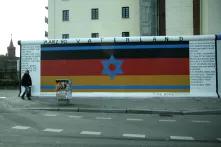German-Israeli Dialog
Articles
More articles about German-Israeli Dialog (148)
Dossiers
More dossier about German-Israeli Dialog (9)
Publications
More publications about German-Israeli Dialog (22)
More pages about German-Israeli Dialog
© Heinrich-Böll-Stiftung e.V.
Schumannstraße 8
10117 Berlin
T +49 (30) 285 34-0
F +49 (30) 285 34-109
www.boell.de
info@boell.de


























